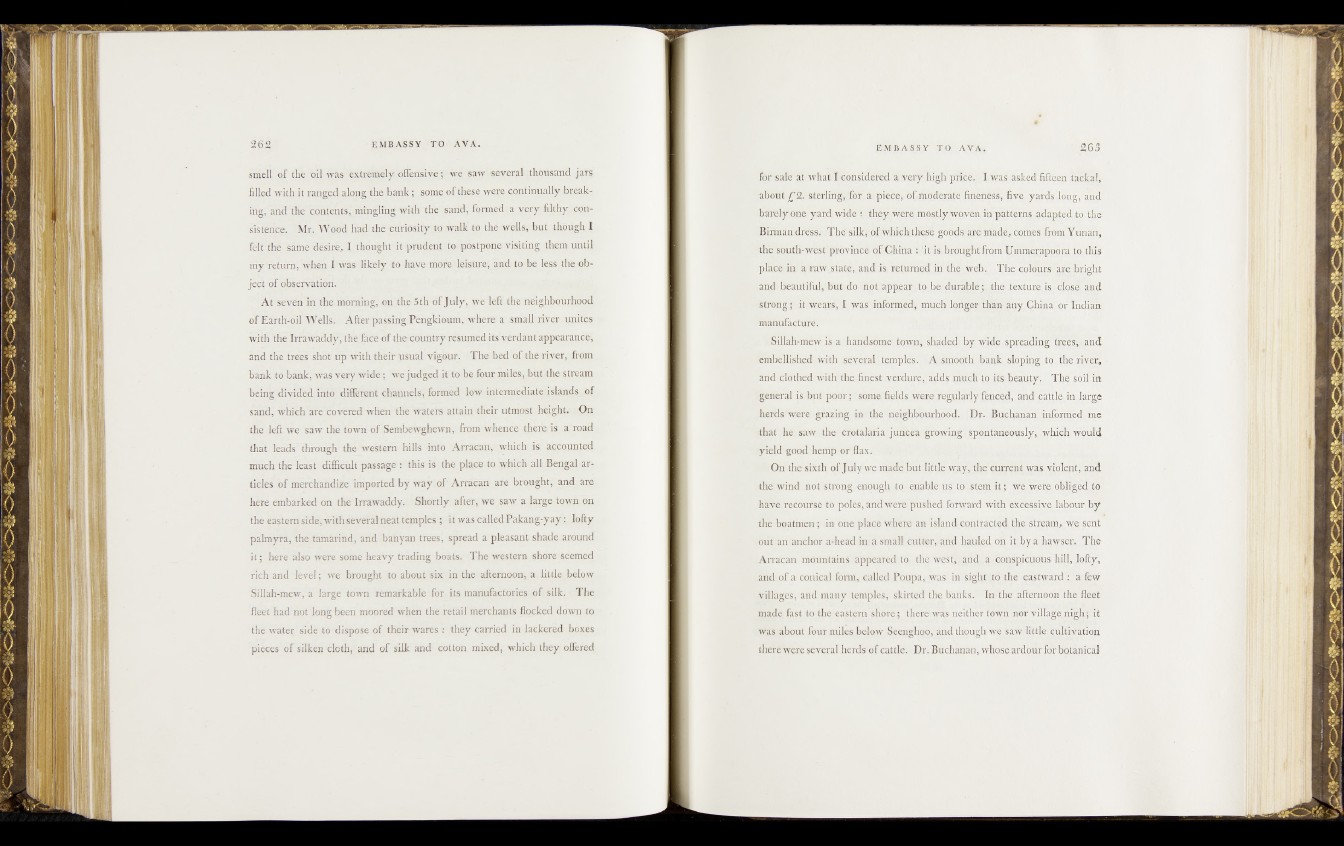
iîïiell “of" fhëJô|l‘was extremely’ëflèi|siyë..; we- saw'^èyeralijthpi|&anfl jgjrÿ
filled with it rangedjdmig ,the bank ;_ ]som^^|^|&e wer,e a^tinuallyib^galgsi
m g ,’and the1 tWpten ts ,\£rripgling with the ■ sarid>fornaed -a yery filthj^ld^a t
slstfehce". 'Mr. Wôtad hadlthe^fairiosifyito walk to the:wells,i but tfroiigh-J
felt'the-/sl&iê‘désiré^I thought''.it prudent to-postpone visiting them until
niyTetum, when'Pwas likely to have-moredefenpey and»,-to-]§g less the object
of observation. J
' At sëven'in the morning, omthe 5th of July, we left the ndighbourho'o^
of Earth-oil Wells. Afterpassing Pengkioum, where-a ^m^i river unites
with the Irrawaddy, the face of thercouritrÿ resumed its verdantappeanan^.
arid the frees shot up with their usual vigour. The bed of the river, from
bank to bank, was very wide; we judged it to be four miles, but'the stream
being divided into different channels, formed low intermediate islands^ of
sand, which are covered when the waters attain their utmost height. On
the left we saw the town of Sembewghewn, from whence there is abroad
that léads~thfr)ugh the western hills into ArraCan, which is ,-^ o p fite d
much the least difficult passage : this is the place to which all Bengal articles
of merchandize imported by way of Arracan are brought, and are
here embarked on the Irrawaddy. Shortly after, we saw a large town on
the eastern side, with several neat temples ; it was called Pakang-yay : lofty
palmyra, the tamarind, and banyan trees, spread a pleasant shade around
it; here also were some heavy trading boats. The western shore seemed
rich and level;, we brought to about six in the afternoon, a little below
Silfah-mew, a large town remarkable for its manufactories of' silk. The
fleet had not long been moored when the retail merchants flocked down to
the water side to dispose of their wares : they carried in lackered boxes
pieces'of .silken cloth, and of silk , and cotton mixed, which they offered
■fsi sale ,at‘v h vSHmnj[i(Uffd e'frIv$»aS, isked fifteeyi taGkal,
’alViuL < 2*siji?rhflgi$|j$j
dfulc-Vy ycuj v u dj w 0
-Eirijjanjdr^lf^Thii * o'lr-v hjj l^tjif.*^ got^iSÜarc, r o t j c V jiOjiiiy'niljq,
-tlic-souLli McstlpVn mtStffafrJiijt i Ijt'jlfn^bjringliijfruiii.Eujjm^innm A.t(l tins
•pl'icc^in) I* l iw^suui, mei js ïy 1,111 nu] iffyjijkWd «giMjS S ^ iuü,ht
.andilïi. UHihthibuii-^ylfliij^pi^^lM^flinnljl „njh
iStrdngj: u s m s , l v js'.ipjprme’d, niydj^y^L^diTn apwtfliin.i.yi IudiMJ
jjnpLmflUot *'
Sill.ih-mow is a 'ilialiftsorncf LSsmcailing-fycLS-y anil
|®tbMlislled \vi%Ji_ Jail'dpkj. k/mooihd) iuk,,¥Ïo,pniKto tbcVjXg
•and clothcd*vviL-fif(E^t^\l^v wilinw^.n-lils mtp-fftp it^bEuii^^^Lhe w n rip
fgenci.il is.-bur pooi s^omi^hjflr(}'s({^egc$nlnuU^^^ riidj^tWc^iUjihufip
^hef!ls'vlifc*).i>ri/ing in/the titiühbourhood t^ÜtliifclSii
it-hat he. saw the crotalanj? g row Ijig J a ^ It'^ iM ^ ly ^K lSw o u ld
isyieMtgbhjd; heiflpirinp $ e f |||
\^ @fr;t|i0léiith of Ji h'we rna^oir^kJUtJUy^^Jthe, current wn&j^ïlMföancl
thelwind not St fpng enough Ji^ójüabk, w.ef.e
^ ^ r e e o ’urse to pdlhs,hrid^Ös^pusJfed forward \\ith ex ce ssiv e j^b u ilh v !
the ^boatmen ;> id hno place where an JsI<tnij^ijmtr.ic1Le®fiFiB,sticain «v-c-sent
ftfiiffan anchor a-head in a sn\aSi ( utLePfhncJ im. iGby .tf'haw s\ i_,. ’1 heiArraban
mountains'appeared to tfie w es^^^jifr’^etmxjiieupiis lull, flolry,
.and-of a conical foim,^l|%dsEphpa,y as ,i jfft i g ht j to „thee^V.riV 1^| aj lew
fejlages, andimafry temp'lt^^kiiied tFfo',K]M’sj5£l Ivmr
m^de fast to ghe eastern shore; there w&s neither town nor \®Sgc ffiglif it
was ahout four miles below SeegLghyo,Jiicl though w c-Naw lurleymmMSioh
ihériw&resêveral herds of cgtttón Dr. Buchanan,. wfïbWafilfclm fprl/otaiiieai